Documents
Rogovin Sheehan memo
Oct. 6 2023 — 9:08 p.m.
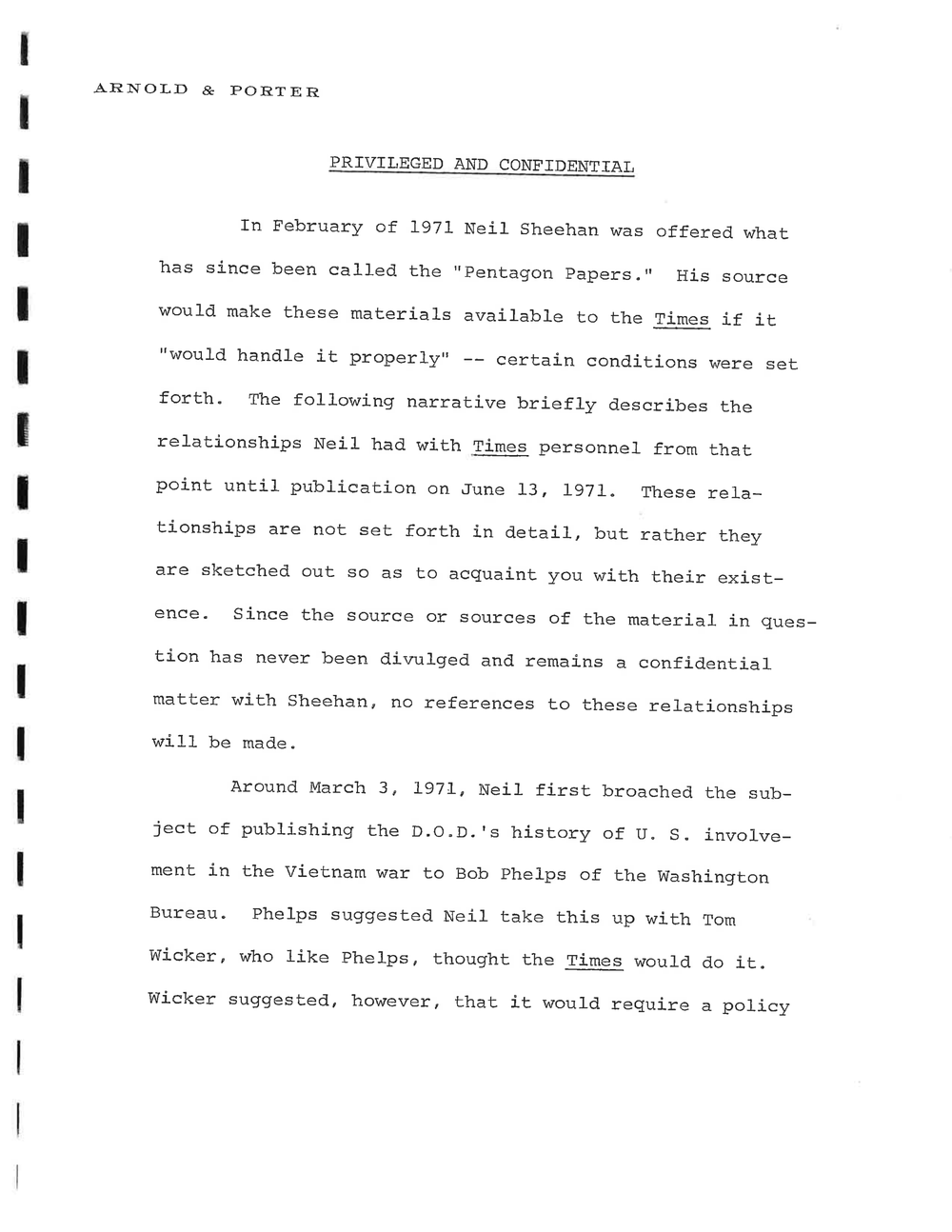
|
ARNOLD & PORTER
|
I PRIVILEGED AND CONFIDENTIAL
1 In February of 1971 Neil Sheehan was offered what
has since been called the "Pentagon Papers.” His source
1 would make these materials available to the Dimes if it
i "would handle it properly’ -- certain conditions were set
forth. The following narrative briefly describes the
I relationships Neil had with Times personnel from that
1 point until publication on June 13, 1971. These rela-
tionships are not set forth in detail, but rather they
I are sketched aut 50 as to acquaint you with their existe
1 ence. Since the source or sources of the material in ques
tion has never been divulged and remains a confidential
| ater with Sheehan, no references to theso relationshise
| will be made.
Around March 3, 1971, Neil first broached the sub-
| Sect of publishing the 5.0.5.1 history of 0. 5. involve.
| ment in the Vietnam war to Bob Phelps of the Washington
Bureau. Phelps suggested Neil take this up with Tom
Hiker, whe 15ks Preis, thought. the Hina outa do
| Wicker suggested, however, that it would require a policy
|
|
|
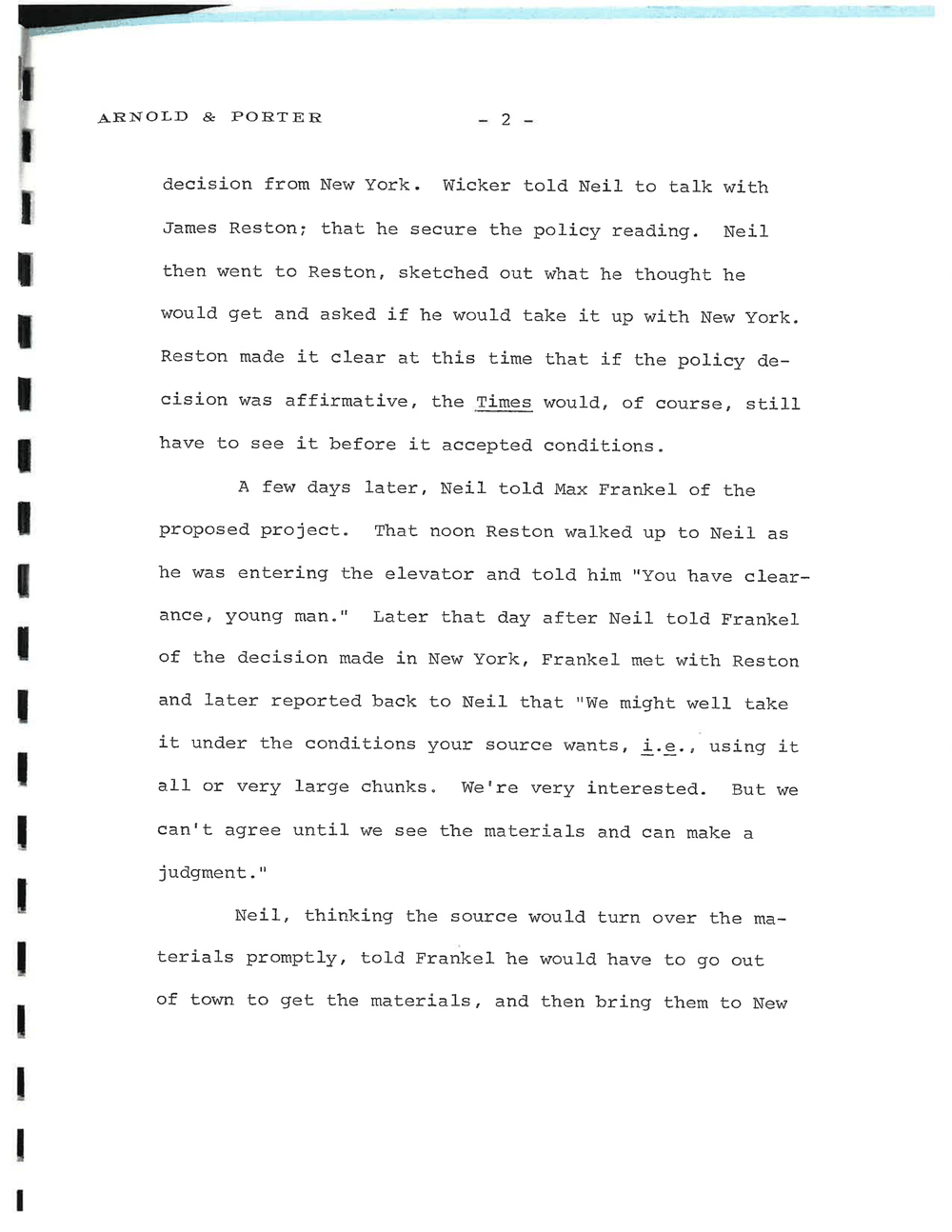
: ARNOLD & PORTER 2.
I
aecision from New York. Wicker told Neil to talk with
1 then went to Reston, sketched out what he thought he
would get and asked if he would take it up with New York.
1 Reston made it clear at this time that if the policy de-
1 cision was affirmative, the Times would, of course, still
1 have to see it before it accepted conditions.
A few days later, Neil told Max Frankel of the
1 proposed project. hat noon Reston valked up to Neil as
1 he was entering the elevator and told him "You have clear-
ance, young man.” Later that day after Neil told Frankel
I of the decision made in New York, Frankel met with Reston
1 and later reported back to Neil that "We might well take
it under the conditions your source wants, i.e., using it
| 311 ox very Laxos chunk. We're very interested. But ue
| can't agree until we see the materials and can make a
Judgment.
| Neil, thinking the source would turn over the ma-
| terials promptly, told Frankel he would have to go out
of town to get the materials, and then bring them to New
|
|
|
1
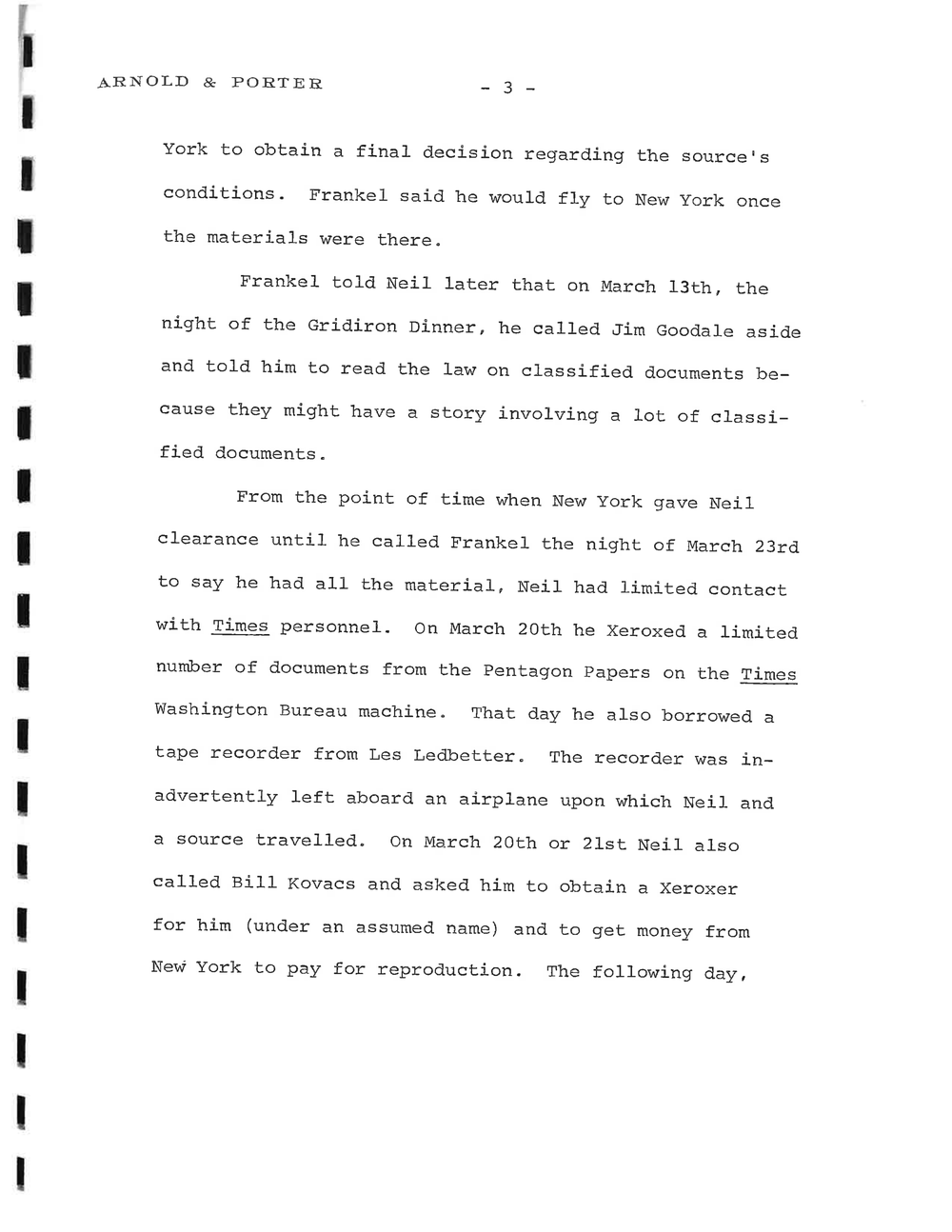
1
York to obtain a final decision regarding the source's
! conditions. Frankel said he would fly to New York once
[ the materials were there.
Frankel told Neil later that on March 13th, the
i Sh of tha Grkizen piso, he coed sin Gost aside
1 2nd told him to read the law on classified documents be-
1 cause they might have a story involving a lot of classi-
fied documents.
1 From the point of time when New York gave Neil
i clearance until he called Frankel the night of March 23rd
to say he had all the material, Neil had limited contact
1 "ith Tines possonnol. On Nereh 206h be Xeroxed a Limited
1 nunber of documents from the Pentagon Papers on the Times
Washington Bureau machine. That day he also borrowed a
I tape recorder from os Ledbetter. The zecorder vas in-
1 advertently left aboard an airplane upon which Neil and
a source travelled. on March 20th or 21st Neil also
I called Bill Kovacs and asked him to obtain a Xeroxer
1 for him (under an assumed name) and to get money from
New York to pay for reproduction. The following day.
1
|
|
|
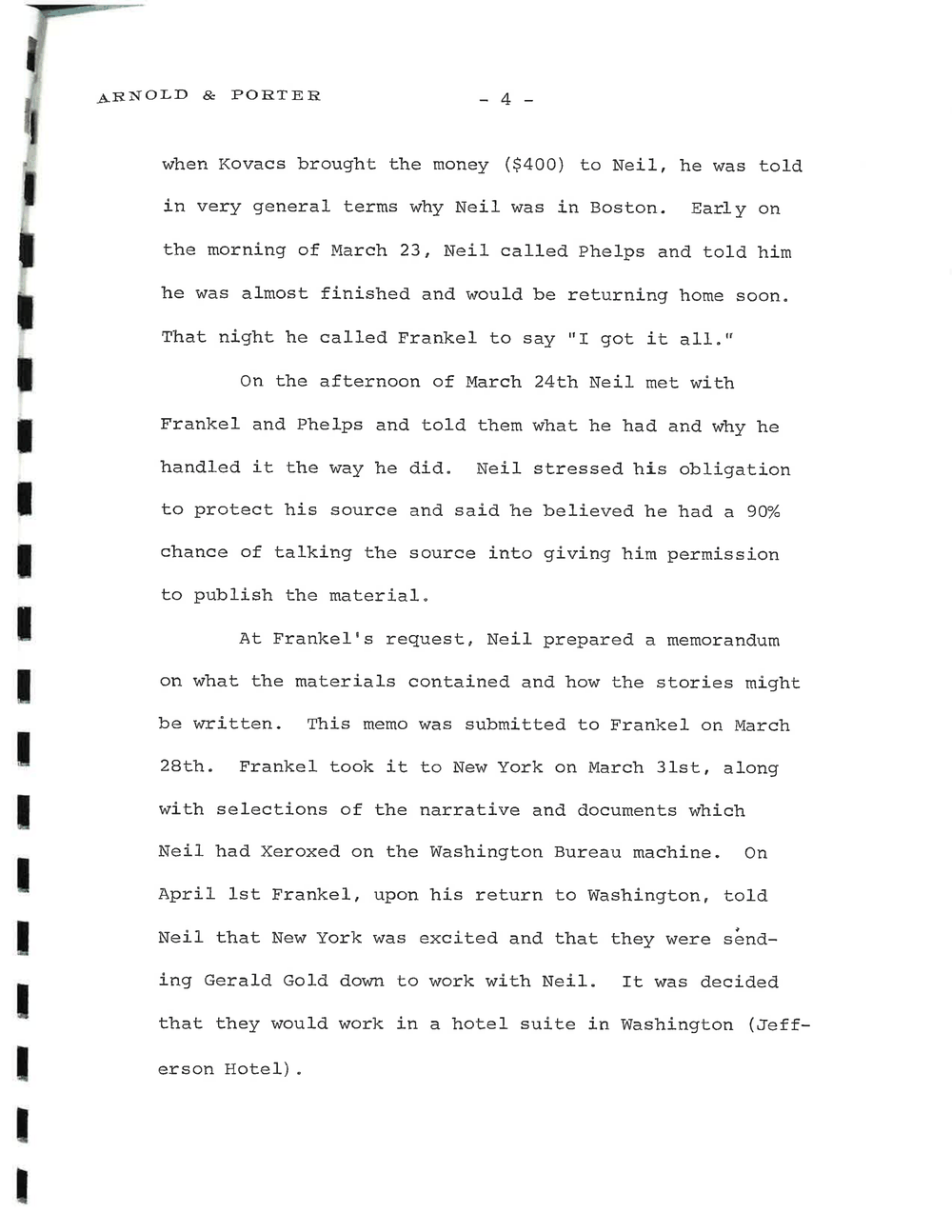
ARNOLD & PORTER “ga
I when Kovacs brought the money ($400) to Neil, he was told
in very general terms why Neil was in Boston. Early on
i the morning of March 23, Neil called Phelps and told him
i he was almost finished and would be returning home soon.
That night he called Frankel to say "I got it all.”
1 On the afternoon of March 24th Neil met with
1 Frankel and Phelps and told them what he had and why he
handled it the way he did. Neil stressed his obligation
1 to protect his source and said he believed he had a 90%
1 chance of talking the source into giving him permission
to publish the material.
1 on what the materials contained and how the stories might
be written. This memo was submitted to Frankel on March
1 28th. Frankel took it to New York on March 31st, along
1 with selections of the narrative and documents which
Neil had Xeroxed on the Washington Bureau machine. On
1 Neil that New York was excited and that they were sénd-
ing Gerald Gold down to work with Neil. It was decided
1 that they would work in a hotel suite in Washington (Jeff-
1 erson Hotel).
1
1
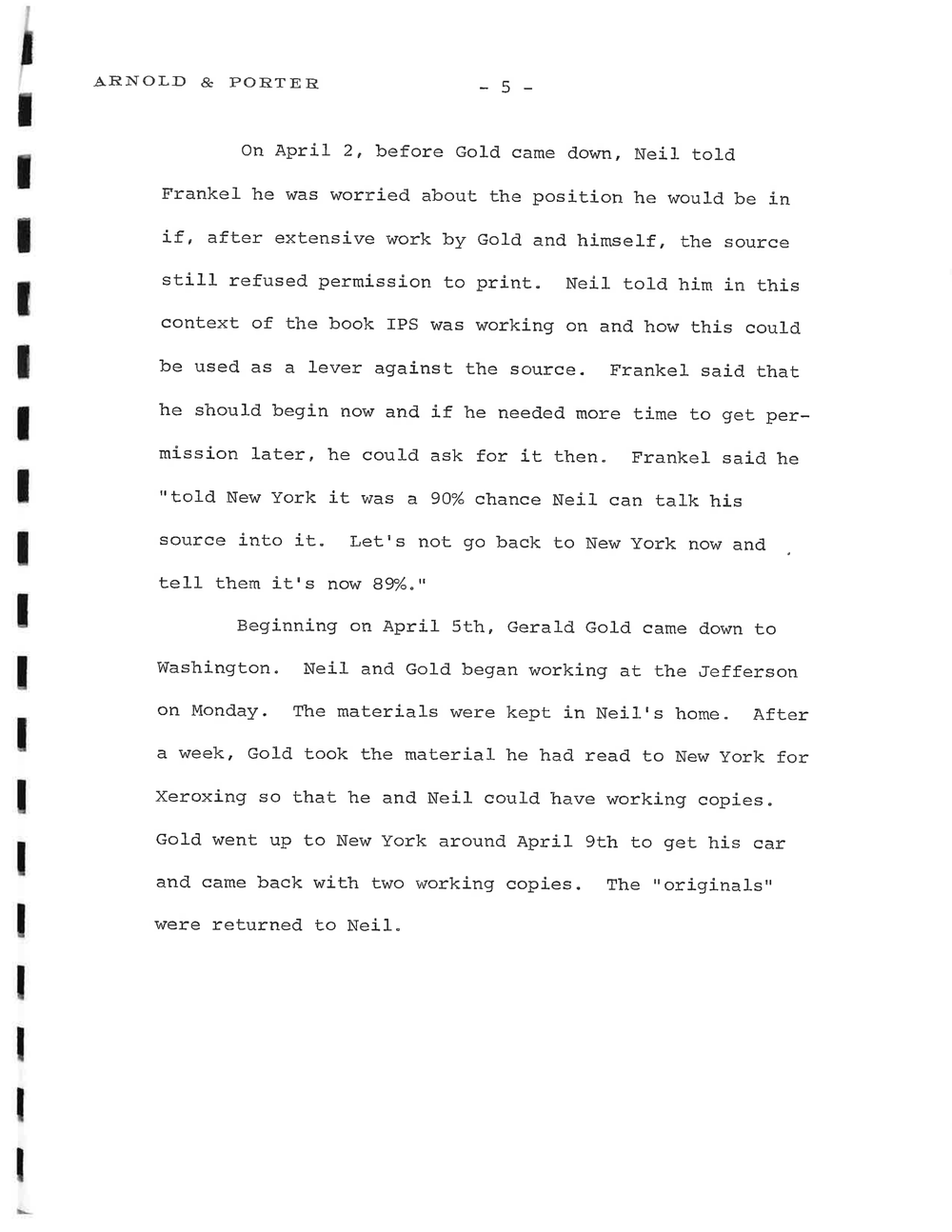
1
ARNOLD & PORTER -s-
1
on April 2, before Gold came down, Neil told
1 Frankel he was worried about the position he would be in
1 if, after extensive work by Gold and himself, the source
still refused permission to print. Neil told him in this
I context of the book IPS was working on and how this could
1 be used as a lever against the source. Frankel said that
1 he should begin now and if he needed more time to get per-
mission later, he could ask for it then. Frankel said he
1 “told New York it was a 90% chance Neil can talk his
1 source into it. Let's not go back to New York now and
tell them it's now 8%."
I Beginning on April 5th, Gerald Gold came down to
1 Washington. Neil and Gold began working at the Jefferson
on tonday. The materials were kept in Neil's home. After
I a week, Gold took the material he had read to New York for
| Xeroxing so that he and Neil could have working copies.
Gold went up to New York around April 9th to get his car
| I
|
|
|
|
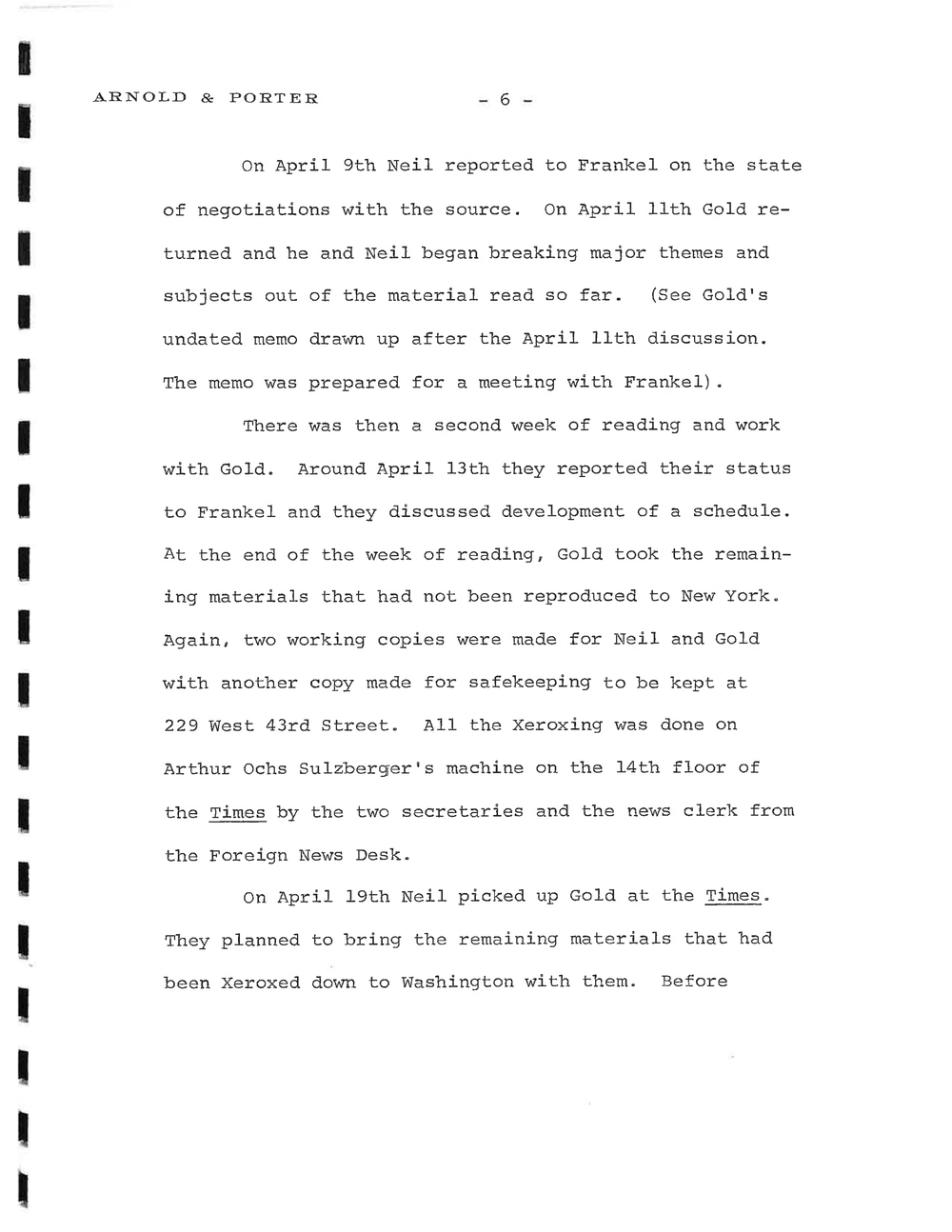
1
ARNOLD & PORTER -6-
1
1 On April 9th Neil reported to Frankel on the state
of negotiations with the source. On April llth Cold re-
1 turned and he and Neil began breaking major themes and
1 subjects out of the material read so far. (See Gold's
undated memo drawn up after the April llth discussion.
1 The memo was prepared for a meeting with Frankel).
1 There was then a second week of reading and work
with Gold. Around April 13th thoy reported their status
1 to Frankel and they discussed development of a schedule.
1 At the end of the week of reading, Gold took the remain-
ing materials that had not been reproduced to New York.
1 Again, two working copies were made for Neil and Gold
1 with another copy made for safekeeping to be kept at
229 West 43rd Street. All the Xeroxing was done on
| the Times by the two secretaries and the news clerk from
the Foreign News Desk.
1 They planned to bring the remaining materials that had
been Xeroxed down to Washington with them. Before
1
1
1
1
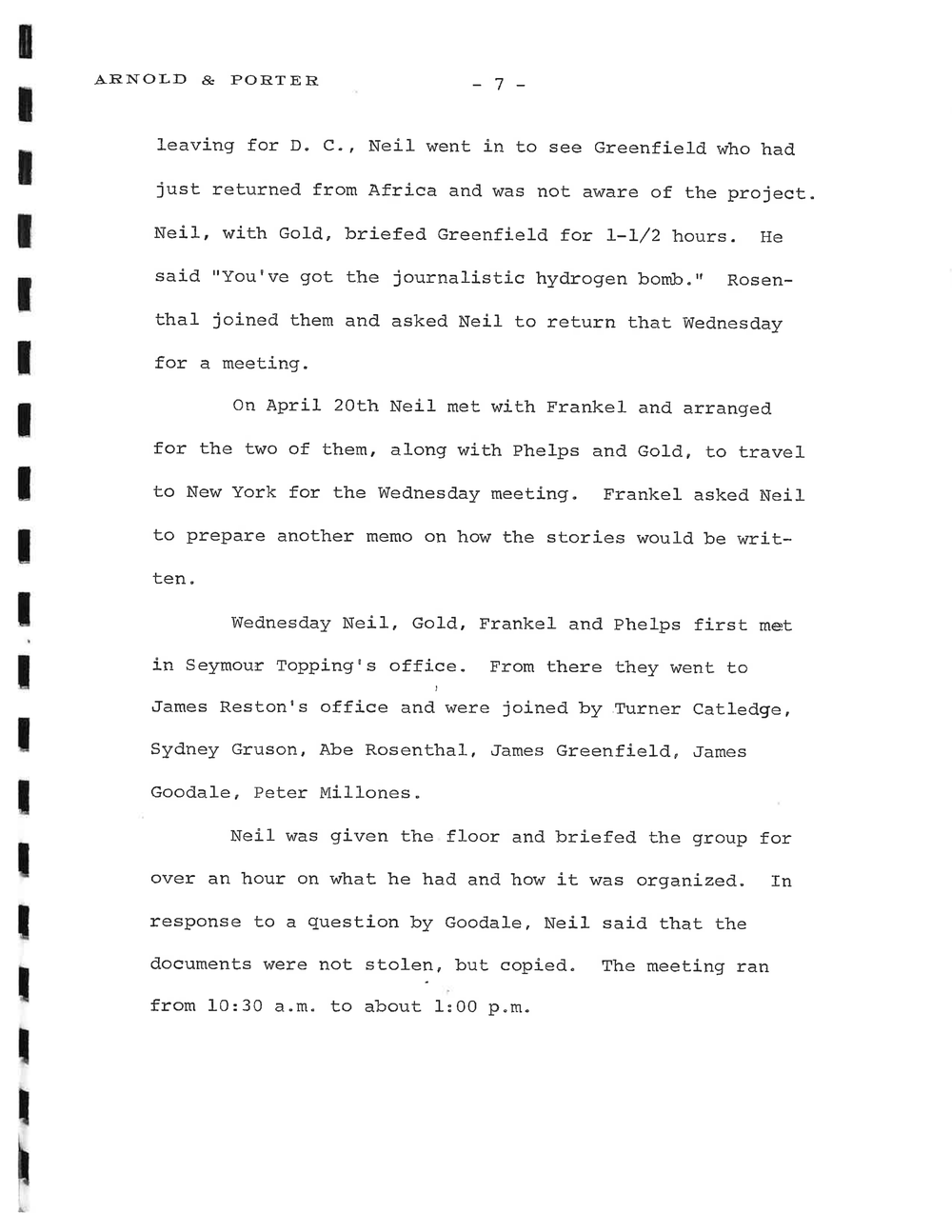
1
ARNOLD & PORTER -7-
1
leaving for D. C., Neil went in to see Greenfield who had
1 just returned from Africa and was mot aware of the project.
1 Neil, with Gold, briefed Greenfield for 1-1/2 hours. He
1 said "You've got the journalistic hydrogen bomb." Rosen-
thal joined them and asked Neil to return that Wednesday
1 On April 20th Neil met with Frankel and arranged
for the two of them, along with Phelps and Gold, to travel
1 to New York for the Wednesday meting. Frankel asked Neil
1 to prepare another memo on how the stories would be writ-
ten.
1 Wednesday Neil, Gold, Frankel and Phelps first met
1 in Seymour Topping's office. From there they went to
James Reston's office and were joined by Turner Catledge,
1 Sydney Gruson, be Rosenthal, Janes Greenfield, sass
1 Goodale, Peter Millones.
Neil was given the floor and briefed the group for
1 response to a question by Goodale, Neil said that the
documents were not stolen, but copied. The meeting ran
I
1
!
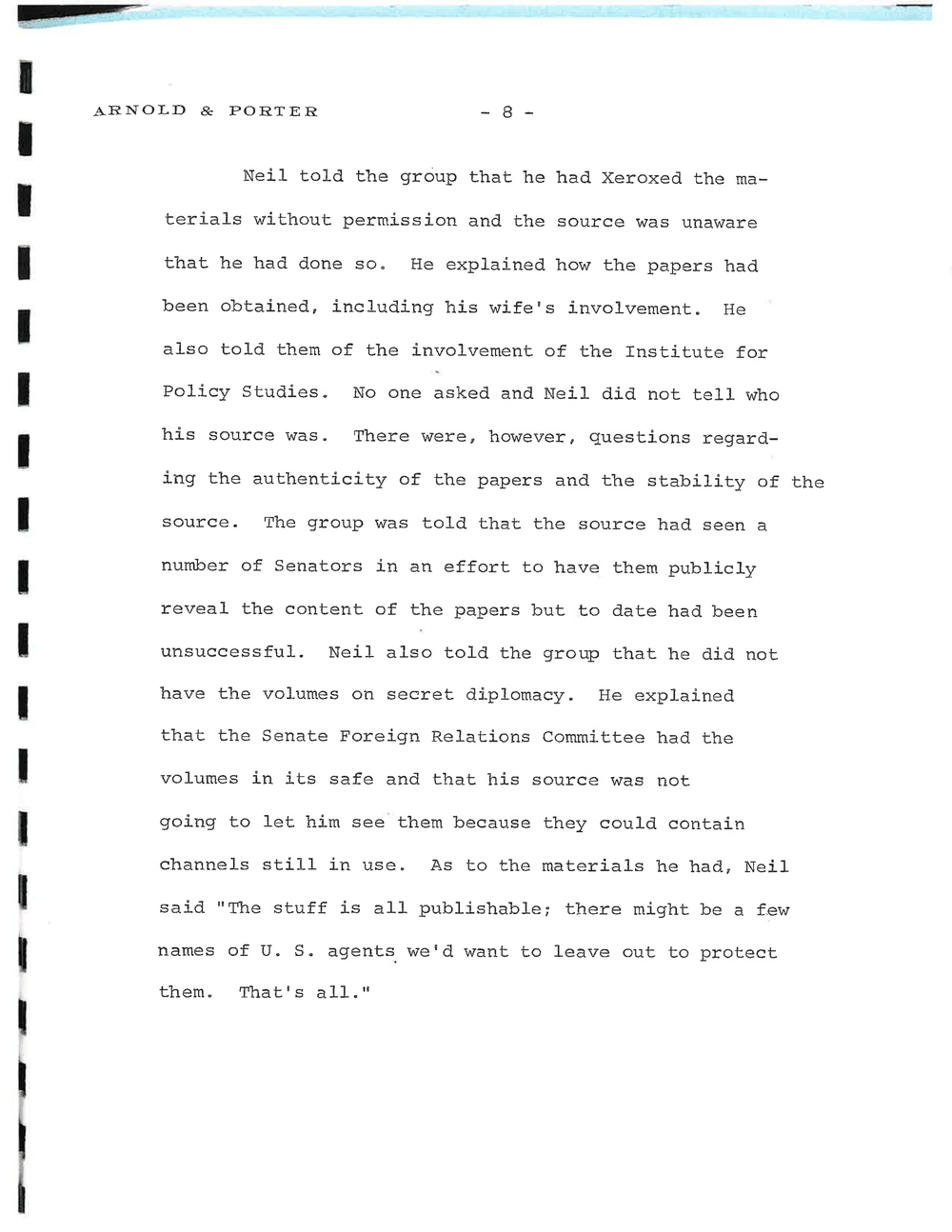
1
ARNOLD & PORTER -8-
1
Neil told the group that he had Xeroxed the ma-
1 terials without permission and the source was unaware
1 hat he had done so. ie explained how the papers Had
been obtained, including his wife's involvement. He
I 2160 Leia thes of the involves of the Teasitut for
| Policy Studies. No one asked and Neil did not tell who
1 his source was. There were, however, questions regard-
ing the authenticity of the papers and the stability of the
1 source. The group was told that the source had seen a
1 number of Senators in an effort to have them publicly
reveal the content of the papers but to date had been
1 unsuccessful. Neil also told the group that he did not
1 have the volumes on secret diplomacy. He explained
that the Senate Foreign Relations Committee had the
I volumes in its safe and that his source was not
1 going to let him see them because they could contain
channels still in use. As to the materials he had, Neil
I said "The stuff is all publishable; there might be a few
| names of U. S. agents we'd want to leave out to protect
them. That's all."
|
|
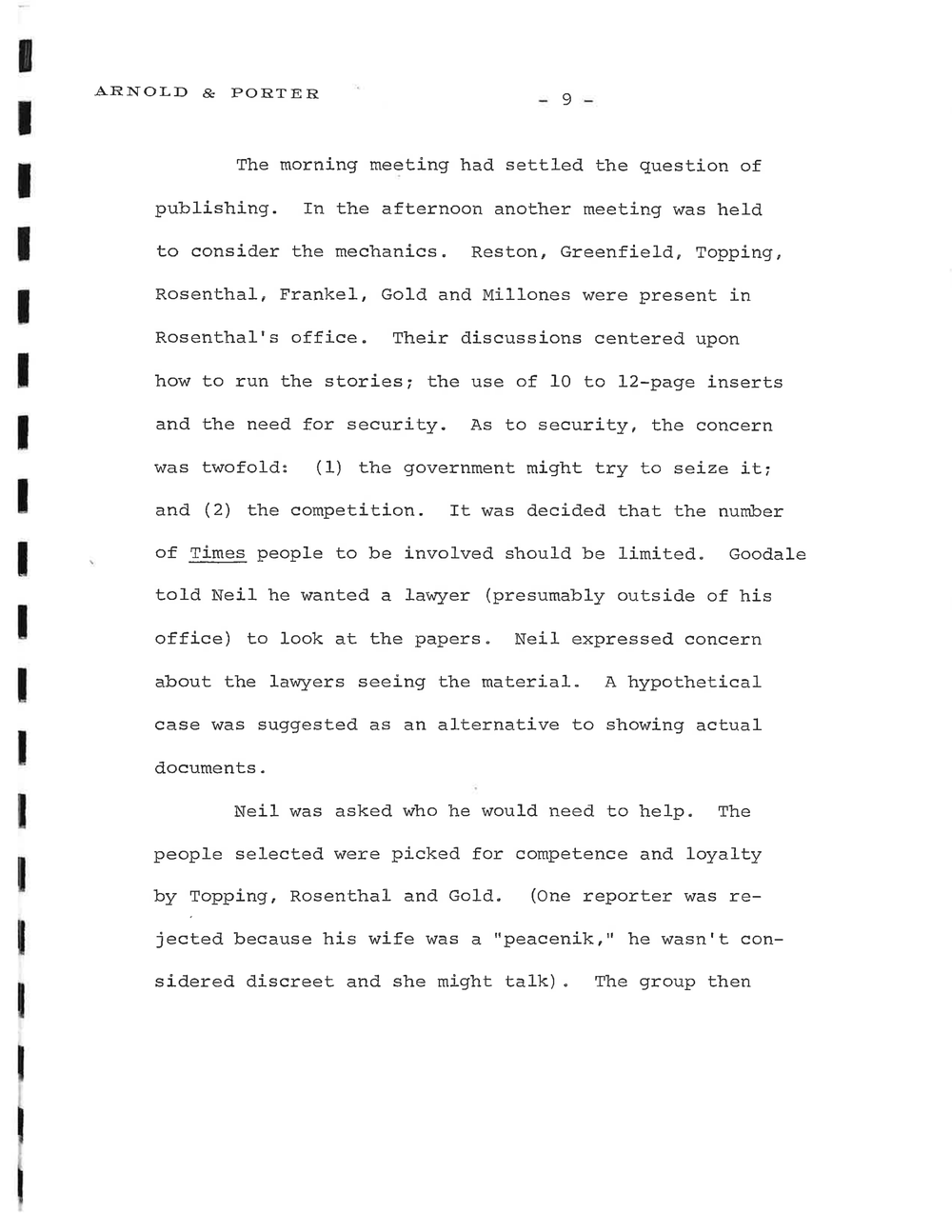
1
ARNOLD & PomTER fr
1
I The morning meeting had settled the question of
publishing. In the afternoon another meeting was held
1 to consider the mechanics. Reston, Greenfield, Topping,
1 Rosenthal, Frankel, Gold and Millones were present in
Rosenthal's office. Their discussions centered upon
1 how to rum the stories; the use of 10 to 12-page inserts
1 and the need for security. As to security, the concern
was twofold: (1) the government might try to seize it:
1 and (2) the competition. Te ves decided that the number
1 of Times people to be involved should be limited. Goodale
told Neil he wanted a lawyer (presumably outside of his
I office) to look at the papers. Neil expressed concern
1 about the lawyers seeing the material. A hypothetical
case was suggested as an alternative to showing actual
| ecm
1 Neil was asked who he would need to help. The
people selected were picked for competence and loyalty
| by Topping, Rosenthal and Gold. (One reporter was re-
| jected because his wife was a "peacenik,” he wasn't con-
| sidered discreet and she might talk). The group then
|
|
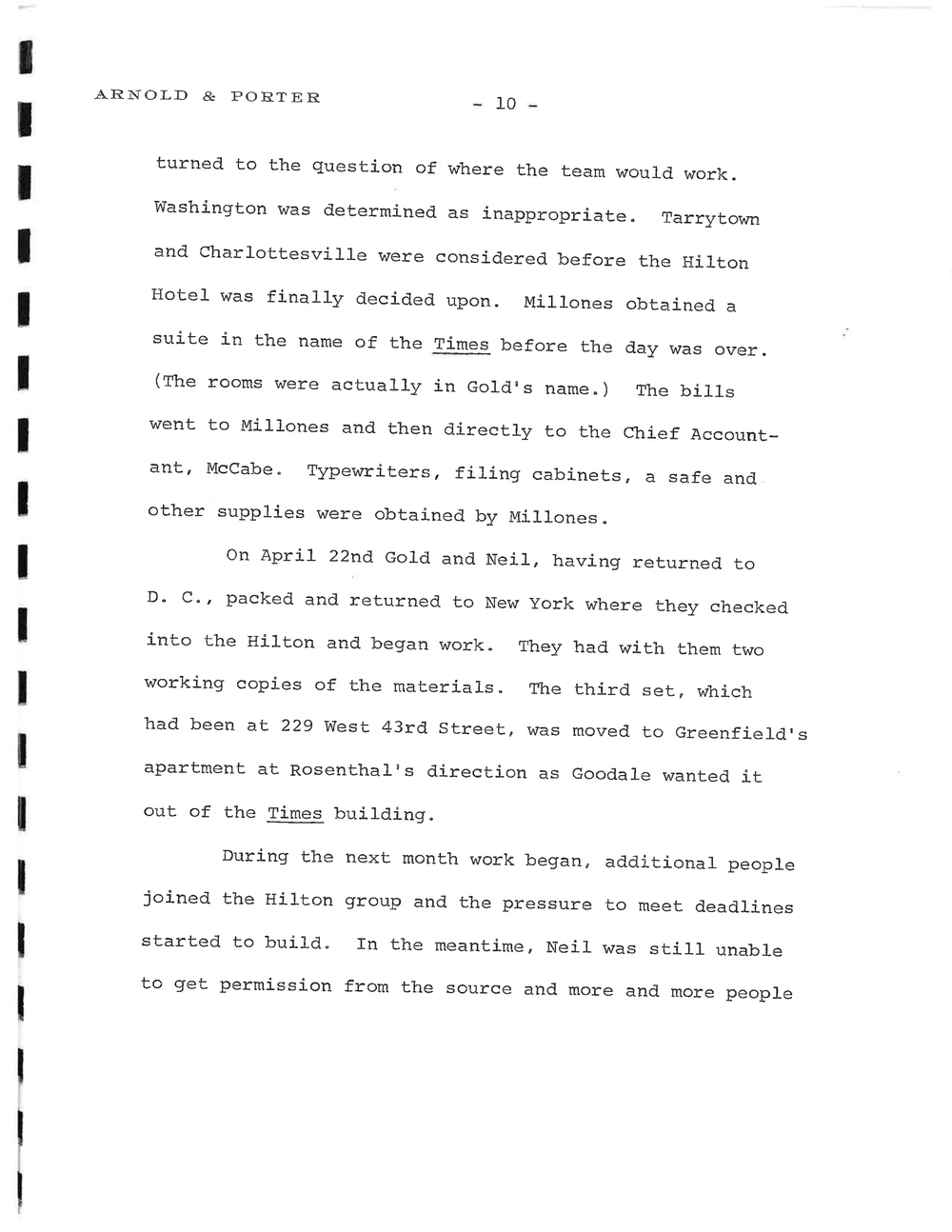
I
ARNOLD & PORTER -10-
1
turned to the question of where the team would work.
1 Washington was determined as inappropriate. Tarrytown
1 and Charlottesville were considered before the Hilton
1 Hotel was finally decided upon. Millones obtained a
suite in the name Of the Times before the day was over.
1 (The rooms were actually in Gold's name.) The bills
1 went to Millones and then directly to the Chief Account
ant, McCabe. Typewriters, filing cabinets, a safe and
1 other supplies were obtained by willonss.
1 On April 22nd Gold and Neil, having returned to
D. C., packed and returned to New York where they checked
1 into the Hilton and began work. They had with them two
1 working copies of the materials. The third set, which
had been at 229 West 43rd Street, was moved to Greenfield's
I apartment at Rosenthal's direction as Goodale wanted it
| out of the Times building.
During the mext month work began, additional people
| joined the Hilton group and the pressure to meet deadlines
| started to build. In the meantime, Neil was still unable
to get permission from the source and more and more people
|
|
|
|
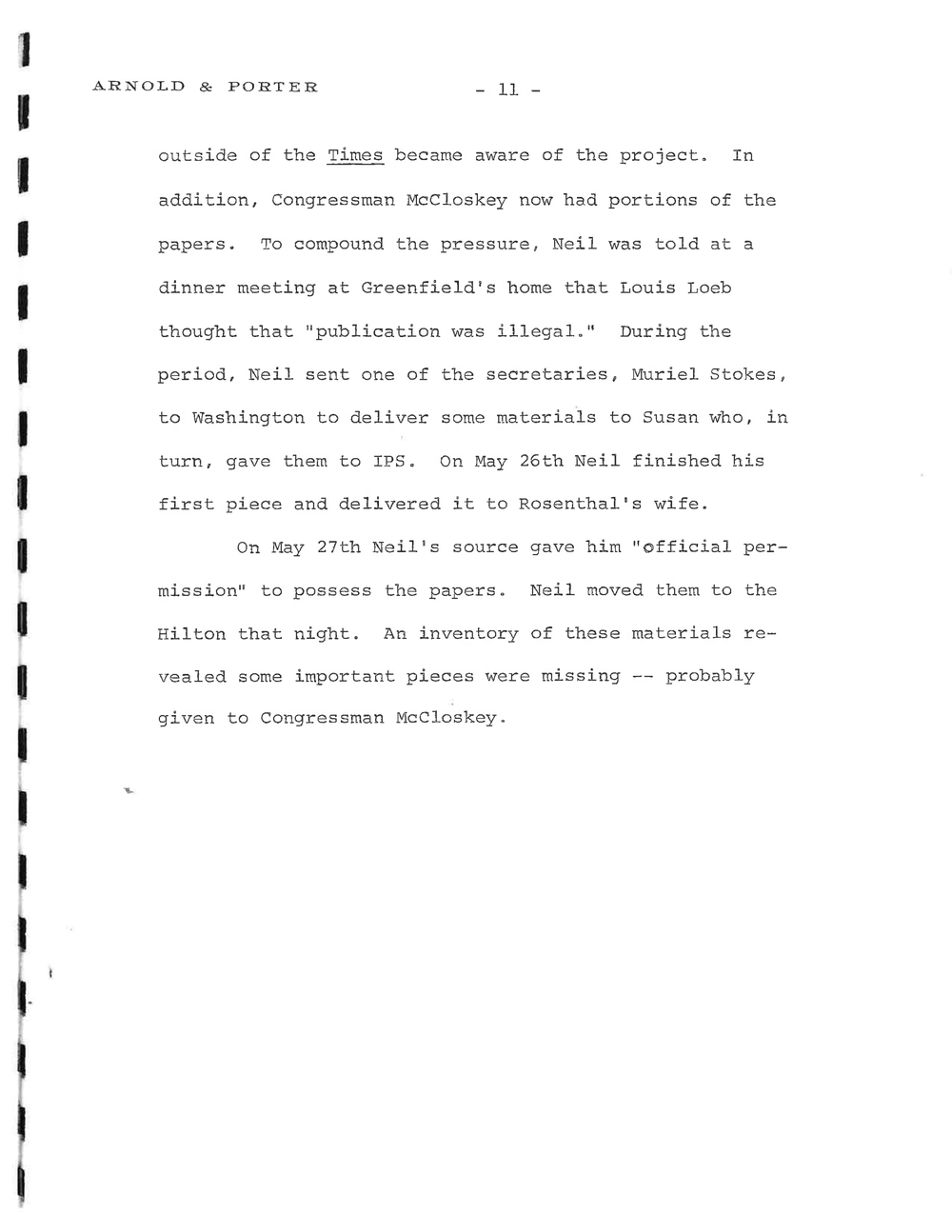
1
ARNOLD & PORTER -1-
I
outside of the Times became aware of the project. In
1 addition, Congressman McCloskey now had portions of the
1 papers. To compound the pressure, Neil was told at a
I dinner meeting at Greenfield's home that Louis Loeb
thought that "publication was illegal.” During the
| period, Neil sent one of the secretaries, Muriel Stokes,
| to Washington to deliver some materials to Susan who, in
turn, gave them to IPS. On May 26th Neil finished his
I first piece and delivered it to Rosenthal's wife.
I On May 27th Neil's source gave him "official per-
mission" to possess the papers. Neil moved them to the
I Hilton that night. An inventory of these materials re-
I vealed some important pieces were missing -- probably
given to Congressman McCloskey.
I
| .
|
!
I
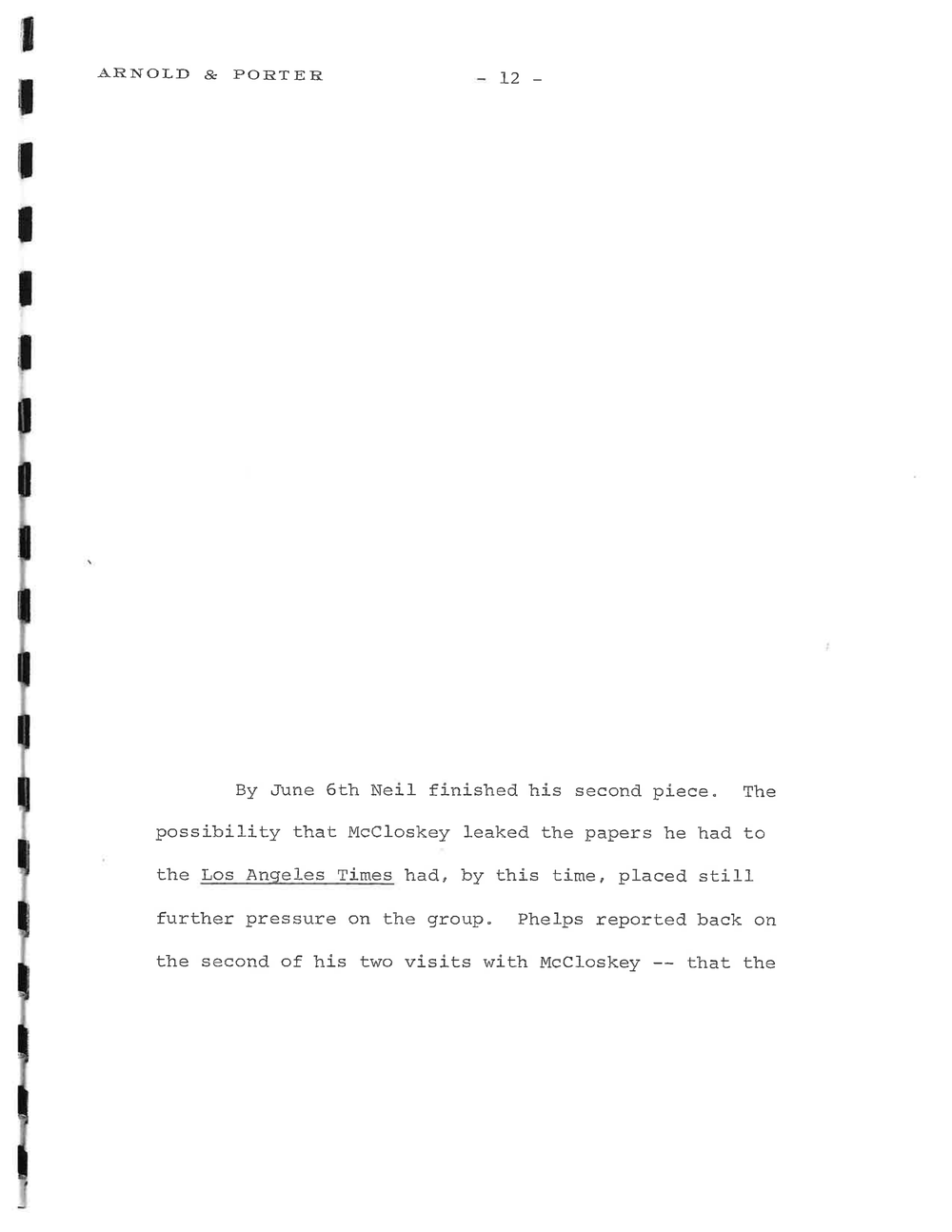
1
ARNOLD & PORTER -12-
1
I
1
i
1
!
By June 6th Neil finished his second piece. The
possibility that McCloskey leaked the papers he had to
the Los Angeles Times had, by this time, placed still
further pressure on the group. Phelps reported back on
the second of his two visits with McCloskey -- that the
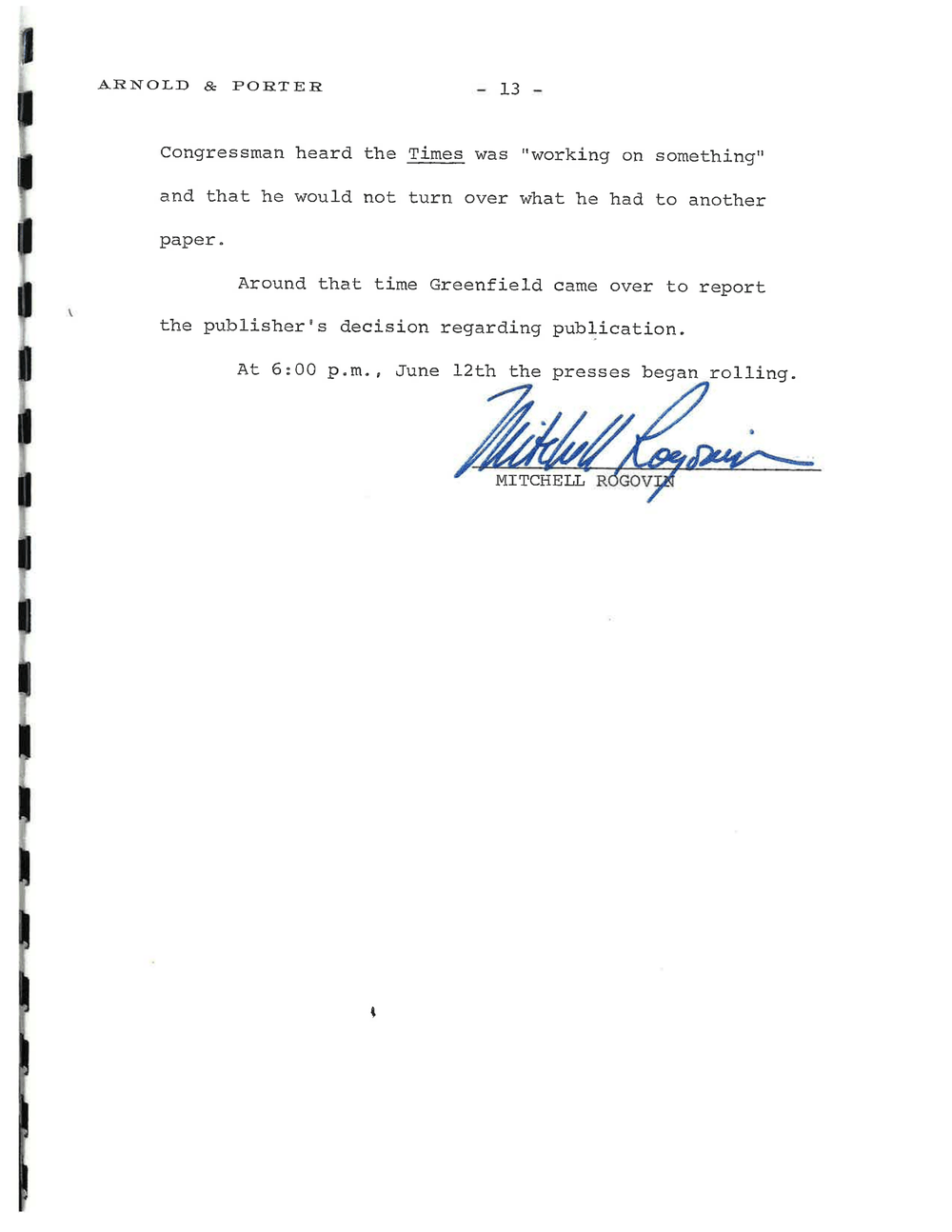
ARNOLD & PORTER Se
Congressman heard the Times was "working on something”
and that he would not turn over what he had to another
paper.
Around that time Greenfield came over to report
' the publisher's decision regarding publication.
At 6:00 p.m., June 12th the presses began rolling.
/ 77 i
‘
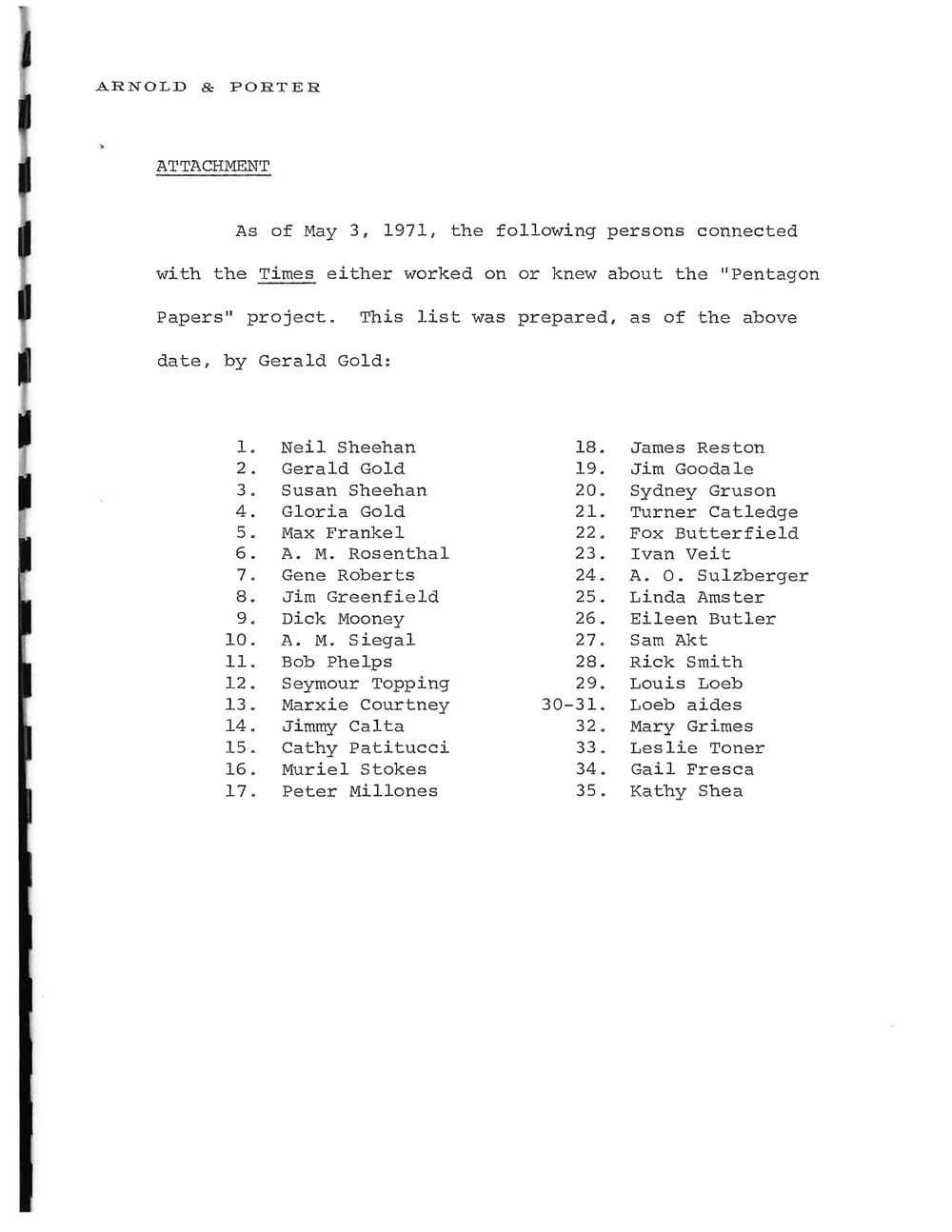
ARNOLD & PORTER
ATTACHMENT
As of May 3, 1971, the following persons connected
with the Times either worked on or knew about the "Pentagon
Papers” project. This list was prepared, as of the above
ate, by Gerald Gold:
1. Neil Sheehan 18. James Reston
2. Gerald Gold 19. Jim Goodale
3. Susan Sheehan 20. Sydney Gruson
4. Gloria Gold 21. Turner Catledge
5. Max Frankel 22. Fox Butterfield
6. A. M. Rosenthal 23. 1van veit
7. Gene Roberts 24. A. 0. Sulzberger
8. Jim Greenfield 25. Linda Amster
9. Dick Mooney 26. Eileen Butler
10. A. M. Siegal 27. sam Akt
11. Bob Phelps 28. Rick Smith
12. seymour Topping 29. Louis Loeb
13. Marxie Courtney 30-31. Loeb aides
14. Jimmy Calta 32. Mary Grimes
15. cathy Patitucci 33. Leslie Toner
16. Muriel Stokes 34. Gail Fresca
17. peter Millones 35. Kathy Shea